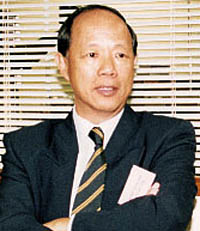



















Force the edge | |
 D OPS Benny Ng Ching-kwok |
AFTER nearly two years, the Force Programme
Management Structure has developed into a cohesive system to enable the Force to plan its operations
and manage its resources into the new millennium, giving it the edge in facing the challenges of the future.
Reduced to its basics, Programme Management entails the management of Force activities by dividing them into programme areas that reflect the core businesses of the Force. This establishes a clear and consistent process for developing objectives, implementing plans and monitoring progress throughout the Force. |
|
Director of Operations and Chairman of the Force Programme Management Steering Group Benny Ng Ching-kwok said: "To put it in the simplest way, Programme Management requires officers at all levels of the Force, from the Commissioner to police constables on the beat, to answer these questions: what are my policing objectives; what resources have I got, or do I need, to achieve these objectives; how am I going to do it; and finally how am I doing?" "At Force level the results can been seen very quickly. The number of papers that the Strategic Direction Group has to consider has been cut by some 85%, reflecting decisions being made at the correct levels. "This means that senior directorate officers have the chance to get out more and communicate with members of the Force in informal visits to find out what their real concerns and needs are," Mr Ng said. When the Government introduced the Target Based Management Process last year, the Force had already worked out its Strategic Directions and decided where it wanted to be next century. "We are well ahead of many other departments and this means that we are able to influence and set the agenda on what we need," Mr Ng noted. "Everybody is concerned about the impact of the Enhanced Productivity Programme (EPP) and the one-line vote," said Mr Ng. "Thanks to Programme Management we now have two yearsŐ experience in setting priorities and managing resources at all levels in the Force. Programme Management gives us a system to fit in the EPP and the one-line vote. "The EPP and the one-line vote will be major challenges for the Force. If we are to face them without the Programme Management system, things wil be much more difficult. "Programme Management has given us an edge, so that we will be able to overcome these challenges and make the best of any opportunities that arise," Mr Ng noted. Financial Controller Kitty Cheng stressed the advantages that Programme Management had given to the financial management of the Force. She said: "In the past two years, we have been able to identify savings of over $250 million and to redirect those funds to where they can do the most good. In previous years most of our savings would have been returned to the Government at the end of the financial year." "Now the one-line vote gives us much more flexibility, right down to District Commander level, to put financial and human resources right where we need them and when we need them," Mrs Cheng said. At Divisional level, Divisional Commander of Tsuen Wan Mike Parker said the challenges which faced him were essentially how to relate Programme Management to the day to day police work in his Division in order to tackle more effectively key local problems. "We identified key policing problems in Tsuen Wan Division, set priorities, drew up realistic objectives and assigned Inspectorate level officers to deal with each identified problem. "We then drew up Activities Plans, set out performance indicators, put in place a monitoring system and adapted the Activities Plans as we gained knowledge and experience," Mr Parker said. During the first year, the Divison essentially focused their Programme Management thrust on reducing key crime in housing estates, combating dangerous drugs and reducing traffic accidents. "We selected housing estates to experiment with the Programme Management approach. Though the overall crime rate in Tsuen Wan Division rose in 1998, crime dropped in these housing estates. The dangerous drugs situation was contained while the number of traffic accidents fell. "Overall, we considered our initial attempt to carry out Programme Management has been relatively successful," concluded Mr Parker. Looking forward, Mr Parker aims to get all ranks involved in the process. Mr Ng said a series of presentations on Programme Management, the EPP and the one-line vote was underway. A consultancy has been engaged to work "hands-on" with frontline commanders on performance indicators and the Headquarter Order on Programme Management has been updated and simplified. "In the final analysis, Programme Management is about allowing police officers to decide what has to be done about policing problems and giving them the resources to do it. "Although there is still work to be done, we have come a long way and the Force is now well equipped to meet the challenges ahead," Mr Ng added. | |

